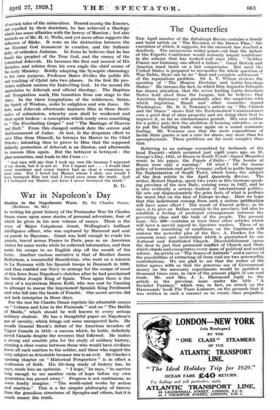War in Napoleon's Day
Studies in the Napoleonic Wars. By Sir Charles Oman. (Methuen. 8s. ed.) IN writing his great history of the Peninsular War Sir Charles Oman came upon some stories of personal adventure, four of which he gives in his new volume of essays. There is the story of Major Cokuhoun Grant, Wellington's brilliant intelligence officer, who was captured by Marmont and sent on parole to Bayonne. Grant was bold enough to evade his guards, travel across France to Paris, pass as an American visitor for some weeks while he collected information, and then make his escape to an English ship off the mouth of the Loire. Another curious narrative is that of Brother James Robertson, a resourceful Benedictine, who went on a mission to La Ronaana with his Spanish troops in Denmark in 1808, and thus enabled-our Navy to arrange for the escape of most of this force from Napoleon's clutches after he had proclaimed his brother Joseph King of Spain-. ' Then again there is the story of a mysterious Baron Kelli, who was sent by Canning to attempt to rescue the imprisoned Spanish King Ferdinand and who fell into the hands of Fouche. Our secret service did not lack enterprise in those days.
For the rest Sir Charles Oman reprints his admirable essays on " Column and Line in the Peninsula " and on " The Battle of Maids," which should be well known to every serious military student. He has a thoughtful paper on Napoleon's use of cavalry, which brings out some unexpected facts. He recalls General Brock's defeat of the American invaders of Upper Canada in 1812—a success which, he holds, definitely saved Canada despite the reverses that followed. He makes a strong and sensible plea for the study of military history, steering a clear course between those who would have civilians leave all such matters to the soldier, and those who regard the very subject as detestable because war is an evil. Sir Charles's opening chapter on " Historical Perspective " is in effect a confession of faith. His life-long study of history has, he says, made him an optimist. " I hope," he says, " to survive long enough to see another vista of hope before my own generation has passed away." Progress is not continuous, as some fondly imagine. " The . world-mind works- by action and reaction." This is a far simpler philosophy of history than the grandiose structures of Spengler and others, but it is much nearer the truth,








































 Previous page
Previous page